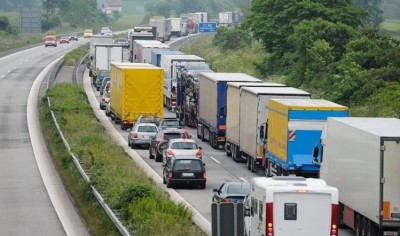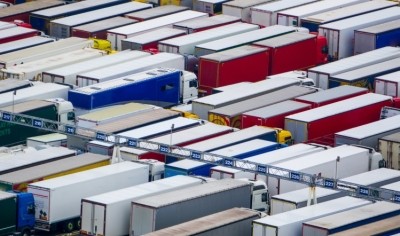French freight ban prompts food supply concerns

France suspended all travel links with the UK, including freight, for 48 hours from midnight on Sunday 20 December.
The ban, enforced as a result of concerns over the new COVID-19 variant, means freight lorries cannot cross by sea or through the Eurotunnel, and the Port of Dover has closed to outbound traffic.
Freight coming to Britain from France is allowed, but there are concerns that lorry drivers will not travel to avoid being stuck in the UK.
Unaccompanied freight, such as containers or lorry trailers on their own, are permitted to be transported, but outbound vans, lorries and trucks are banned.
Hauliers have been advised to find other routes into the continent.
Urgency required
Ian Wright, chief executive of the Food and Drink Federation (FDF), called on the government to “very urgently” persuade France to exempt accompanied freight from its ban.
“Tonight’s suspension of accompanied freight traffic from the UK to France has the potential to cause serious disruption to UK Christmas fresh food supplies – and exports of UK food and drink,” Wright warned in a statement released on Sunday.
“Continental truckers will not want to travel here if they have a real fear of getting marooned,” he added.
Driver concerns
Freight industry lobby Logistics UK said it was “very concerned about the welfare of drivers travelling from the UK to France and this time”, and that it was “urgently seeking more information for our members”.
“Shoppers should not panic buy – retailers will be making every effort to ensure there is stock within the system, including fresh produce, and it is important that we remember that inbound traffic still has access to the UK,” the organisation added.
“We are maintaining close contact with UK government to ensure that supplies of fresh produce are available throughout Christmas and the New Year.”
Capacity difficulties
Andrew Opie, director of food & sustainability at the British Retail Consortium (BRC), admitted the French ban “poses difficulties for UK capacity to import and export key goods during the busy Christmas period”.
“While goods can enter from France, few haulage firms will be willing to send trucks and drivers across to the UK without a guarantee they can return to the EU in a timely manner,” he said. “This is a key supply route for fresh produce at this time of year: the channel crossings see 10,000 trucks passing daily during peak periods such as in the run up to Christmas.
“We urge the UK government and the EU to find a pragmatic solution to this as soon as possible, to prevent disruption for consumers.
“Retailers have stocked up on goods ahead of Christmas, which should prevent immediate problems. However, any prolonged closure of the French border would be a problem as the UK enters the final weeks before the transition ends on 31st December.”
Mella Frewen, director general of FoodDrinkEurope, urged the European Commission to work with national authorities to exempt food and drink products from the travel ban. This would “help drivers out of queues, while ensuring all health and safety measures are applied”.
“Since the start of the pandemic, food and drink has been considered as ‘essential’ by the EU and allowed to move across borders with as little disruption as possible, and that should continue,” she said.
Perfect storm
“With this latest crisis, and Brexit still not resolved, we are staring down the barrel of a perfect storm,” added Frewen.
“Food and drink businesses in the EU and UK still have no idea what rules will apply to traded goods from 1 January and without rapid interventions from the European Commission, member state and UK authorities, we could see unprecedented chaos at our borders with damage to businesses already suffering from the impact of COVID-19, uncertainty for thousands of agri-food sector workers, at the worst possible time, and further impact on consumers who could see food prices increase and customer choice diminish.”
















